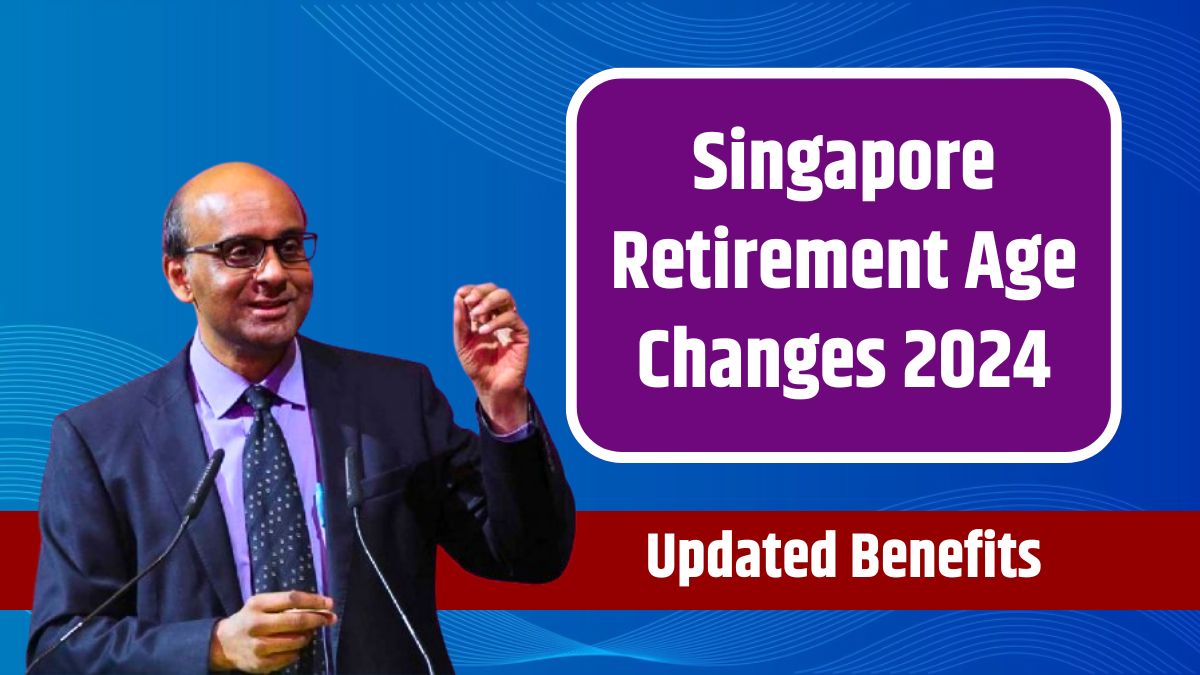Singapore’s retirement system is structured to provide citizens and permanent residents with a solid financial foundation as they age, ensuring a balanced approach to sustaining a capable workforce. While the official retirement age hasn’t changed in 2024, Singapore has announced an increase that will come into effect in 2026.
This update is part of a gradual process to allow both individuals and employers to adapt smoothly to the evolving workforce needs and demographics. Read on to discover the essential details regarding Singapore’s new retirement age, how it will impact employees and employers, and whether there are any associated changes to retirement fund amounts.
Retirement Age
As of 2024, Singapore’s official retirement age remains at 63. However, beginning in July 2026, this age will rise to 64, with an additional increase to 65 projected by 2030. For those interested in re-employment opportunities, the eligibility age will also shift to 69 in 2026, eventually reaching 70 by 2030.
This step-by-step increase is part of Singapore’s strategy to adapt to a changing workforce, allowing businesses to retain experienced employees while providing older workers with options to continue their careers if desired.
| Year | Minimum Retirement Age | Re-employment Age |
|---|---|---|
| Current | 63 | 68 |
| 2026 | 64 | 69 |
| 2030 | 65 | 70 |
Implications
- Enhanced Talent Pool: With more experienced workers available for longer, businesses can benefit from retaining senior staff who offer expertise and stability, which can be especially useful in industries facing talent shortages.
- Cost Implications: Keeping older employees may come with increased costs, particularly for those companies that adjust compensation with tenure. Employers might also see higher healthcare expenditures as they provide benefits to a more mature workforce.
- Workplace Adaptation: This shift may encourage companies to review their workplace structures and policies, possibly offering flexible or part-time work arrangements to better accommodate older employees.
For Employees
- Extended Earnings: Working longer provides the opportunity to increase retirement savings, which can translate into greater financial security.
- More Flexibility: Employees now have a choice to continue working if they wish, which may be beneficial for those who seek social engagement, financial support, or fulfillment from their work.
- Potential Hurdles: While the option to work longer can be advantageous, not all senior citizens may be physically or mentally equipped for extended careers. This can present a challenge for individuals who find the demands of work increasingly strenuous with age.
Retirement Fund Amount Changing?
The change in retirement age won’t impact the amount that individuals can withdraw from their Central Provident Fund (CPF) savings. CPF is Singapore’s social security saving scheme, designed to offer retirement income.
The retirement amount needed, known as the CPF Minimum Sum, and the CPF withdrawal age will remain the same. However, the 2024 budget introduced an increase to the Enhanced Retirement Sum (ERS) limit.
This adjustment allows people to make additional contributions to their CPF, either through individual savings or topping-up schemes. Through such contributions, individuals may see a higher payout through CPF LIFE, Singapore’s retirement income program, which is designed to provide lifelong monthly payments to support retirees financially.
CPF LIFE Retirement Sum Tiers
| Retirement Sum Category | Amount Required | Potential Monthly Payout |
|---|---|---|
| Basic Retirement Sum | S$99,400 | S$740 – S$800 |
| Full Retirement Sum | S$198,800 | S$1,480 – S$1,600 |
| Enhanced Retirement Sum | S$298,200 | S$2,220 – S$2,400 |
Note: Monthly payout estimates are approximate and depend on CPF LIFE plan choice.
Preparation for Retirement
Regardless of the rising retirement age, planning remains essential to ensure financial security. Each individual’s retirement needs vary, often influenced by lifestyle, anticipated expenses, and personal goals. Thus, building a solid retirement strategy is crucial to cover potential costs and maintain a comfortable standard of living during retirement.
Singapore’s CPF system provides a unique foundation for retirement planning, encouraging steady contributions from both employees and employers. The CPF also offers controlled investment options within the Special Account (SA), allowing individuals to seek potential returns that might enhance their overall retirement savings. These options create a proactive approach for Singaporeans aiming to address their future needs effectively.
Ultimately, Singapore’s decision to raise the retirement age reflects a thoughtful adaptation to changing demographics and workforce dynamics, allowing those who wish to work longer to do so, potentially building a more secure retirement foundation.
FAQs
When will the retirement age change take effect?
The increase to 64 will begin in July 2026.
What is the current retirement age in Singapore?
The retirement age remains at 63 in 2024.
Does the CPF withdrawal amount change with the retirement age?
No, CPF withdrawal amounts remain unchanged.
How does CPF LIFE support retirees?
CPF LIFE offers monthly payments to provide financial support for retirees.
Will re-employment age increase in the future?
Yes, it will increase to 69 in 2026 and 70 by 2030.






















